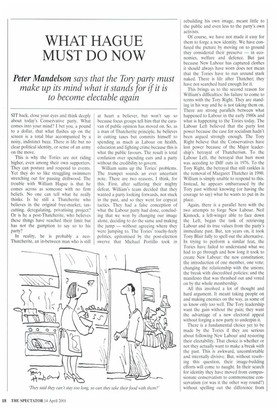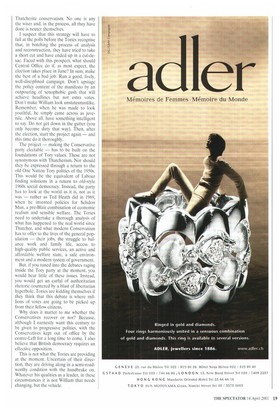WHAT HAGUE MUST DO NOW
Peter Mandelson says that the Tory party must make up its mind what it stands for if it is to become electable again
SIT back, close your eyes and think deeply about today's Conservative party. What comes into your mind? I bet you, a pound to a dollar, that what flashes up on the screen is a total blur accompanied by a noisy, indistinct buzz. There is life but no clear political identity, or sense of an army on the move.
This is why the Tories are not riding higher, even among their own supporters. They can posture and respond to events. Yet they do so like struggling swimmers stretching out for passing driftwood. The trouble with William Hague is that he comes across as someone with no firm beliefs. No one can tell what he really thinks. Is he still a Thatcherite who believes in the original free-market, taxcutting, deregulating, privatising project? Or is he a post-Thatcherite, who believes these things have reached their limit but has not the gumption to say so to his party?
In reality, he is probably a neoThatcherite, an in-between man who is still at heart a believer, but won't say so because focus groups tell him that the caravan of public opinion has moved on. So, as a man of Thatcherite principle, he believes in cutting taxes but commits himself to spending as much as Labour on health, education and fighting crime because this is what the public favours. The result is total confusion over spending cuts and a party without the credibility to govern.
William sums up the Tories' problems. The trumpet sounds an ever uncertain note. There are two reasons, I think, for this. First, after suffering their mighty defeat, William's team decided that they wanted a party looking forwards, not stuck in the past, and so they went for copycat tactics. They had a false conception of what the Labour party had done, concluding that we won by changing our image alone, deciding to do the same and making the jump — without agreeing where they were jumping to. The Tories' touchy-feely politics, epitomised by the post-election swerve that Michael Portillo took in rebuilding his own image, meant little to the public and even less to the party's own activists.
Of course, we have not made it easy for them to forge a new identity. We have confused the picture by moving on to ground they considered their preserve — in economics, welfare and defence. But just because New Labour has captured clothes it should always have worn does not mean that the Tories have to run around stark naked. There is life after Thatcher; they have not searched hard enough for it.
This brings us to the second reason for William's difficulties: his failure to come to terms with the Tory Right. They are standing in his way and he is not taking them on. There are strong parallels between what happened to Labour in the early 1980s and what is happening to the Tories today. The Labour Left believed that the party lost power because the case for socialism hadn't been argued strongly enough. The Tory Right believe that the Conservatives have lost power because of the Major leadership's betrayal of Thatcherism. To the Labour Left, the betrayal that hurt most was acceding to IMF cuts in 1976. To the Tory Right, the betrayal that still rankles is the removal of Margaret Thatcher in 1990. William is simply unable to respond to this. Instead, he appears embarrassed by the Tory past without knowing (or having the courage to say) what he wants to put in its place.
Again, there is a parallel here with the two attempts to. forge New Labour. Neil Kinnock, a left-winger able to face down the Left, began the task of retrieving Labour and its true values from the party's immediate past. But, ten years on, it took Tony Blair fully to spell out the alternative. In trying to perform a similar feat, the Tories have failed to understand what we had to go through and how long it took to create New Labour: the new constitution; the introduction of one member, one vote; changing the relationship with the unions; the break with discredited policies; and the manifesto that was thrashed out and voted on by the whole membership.
All this involved a lot of thought and hard argument. It meant taking people on and making enemies on the way, as some of us know only too well. The Tory leadership want the gain without the pain; they want the advantage of a new electoral appeal without forging a new party to underpin it.
There is a fundamental choice yet to be made by the Tories if they are serious about following New Labour and restoring their electability. That choice is whether or not they actually want to make a break with the past. This is awkward, uncomfortable and internally divisive. But, without resolving this question, their image-building efforts will come to naught. In their search for identity they have moved from compassionate conservatism to commonsense conservatism (or was it the other way round?) without spelling out the difference from Thatcherite conservatism. No one is any the wiser and, in the process, all they have done is neuter themselves.
I suspect that this strategy will have to fail at the polls before the Tories recognise that, in botching the process of analysis and reconstruction, they have tried to take a short cut and have ended up in a cul-desac. Faced with this prospect, what should Central Office do if, as most expect, the election takes place in June? In sum, make the best of a had job. Run a good, lively, well-disciplined campaign. Don't upstage the policy content of the manifesto by an outpouring of xenophobic gush that will achieve headlines but not extra votes. Don't make William look unstatesmanlike. Remember, when he was made to look youthful, he simply came across as juvenile. Above all, have something intelligent to say. Do not get down in the gutter (you only become dirty that way). Then, after the election, start the project again — and this time do it thoroughly.
The project — making the Conservative party electable — has to be built on the foundations of Tory values. These are not synonymous with Thatcherism. Nor should they be expressed through a return to the old One Nation Tory politics of the 1950s. This would be the equivalent of Labour finding solutions in a return to old-style 1960s social democracy. Instead, the party has to look at the world as it is, not as it was — rather as Ted Heath did in 1969, when he invented policies for Selsdon Man, a pre-Blair combination of economic realism and sensible welfare. The Tories need to undertake a thorough analysis of what has happened to the real world since Thatcher, and what modern Conservatism has to offer to the lives of the general population — their jobs, the struggle to balance work and family life, access to high-quality public services, an active and affordable welfare state, a safe environment and a modern system of government.
But, if you tuned into the debates raging inside the Tory party at the moment, you would hear little of these issues. Instead, you would get an earful of authoritarian rhetoric countered by a blast of libertarian hyperbole. Tories are kidding themselves if they think that this debate is where millions of votes are going to be picked up from their fellow citizens.
Why does it matter to me whether the Conservatives recover or not? Because, although I earnestly want this century to be given to progressive politics, with the Conservatives kept out of office by the centre-Left for a long time to come, I also believe that British democracy requires an effective opposition.
This is not what the Tories are providing at the moment. Uncertain of their direction, they are driving along in a semi-roadworthy condition with the handbrake on. Whatever his qualities as a leader, in these circumstances it is not William that needs changing, but the vehicle.



























































 Previous page
Previous page